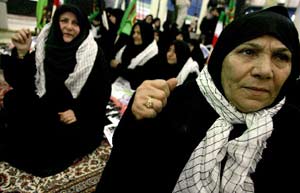
Iranian women chant slogans during a gathering to support Iran's
leaders and the nuclear program, as they gather at the mausoleum of the Iran's
late revolutionary founder Ayatollah Khomeini, just outside Tehran
yesterday.(Xinhua Photo)
Iran warned yesterday on the eve of a key U.N. nuclear watchdog meeting that
it would resume large-scale uranium enrichment if its nuclear case was referred
to the U.N. Security Council.
"If the nuclear dossier is referred to the UN Security Council,Iran will have
to resume uranium enrichment," chief nuclear negotiator Ali Larijani told
reporters at a press conference.
Vowing not to suspend small-scale enrichment work as required by the European
Union (EU) and Russia, Larijani said "nuclear technology is one of Iran's
sovereign rights which can never be abandoned."
Larijani's comments came just one day before a crucial meeting of the
International Atomic Energy Agency (IAEA) board of governors.
The UN nuclear watchdog adopted a resolution on Feb. 4 to report Iran's case
to the UN Security Council but called on the powerful UN body to withhold
punitive actions until the agency's meeting on March 6.
The IAEA resolution was seen as just a gesture aimed to press Iran to be more
cooperative, but the meeting on Monday will be decisive for officially reporting
or referring the case to the UN Security Council.
An IAEA report on the Iranian nuclear issue, drafted by the agency's Director
General Mohamed ElBaradei for the meeting on Monday but revealed in late
February, said that ambiguities on the scope and nature of Iran's nuclear
program have not been clarified after three years of investigations.
The Washington Post reported on Saturday that the United States,pushing for
Iran's case to be referred to the UN Security Council,is seeking a 30-day
deadline for Tehran to halt its nuclear program and cooperate with international
inspectors.
Also on Saturday, Larijani wrapped up a diplomatic tour to Vienna, where he
held discussions with foreign ministers of the EU trio of Britain, France and
Germany and the IAEA chief ElBaradei.
Larijani suggested that Iran should accept a selective suspension on its
enrichment-related work, a last-ditch effort by Tehran to ease the tension.
The EU, however, turned down the Iranian proposal of putting a two-year
moratorium on its industrial-scale uranium enrichment while continuing nuclear
research.
Prior to his visit to the Austrian capital, Larijani held a round of two-day
negotiations with Russian officials in Moscow on a compromise proposal aimed to
break the deadlock on the Iranian nuclear issue.
Russia proposed last December that the two countries establish a joint
venture in Russia to enrich uranium for Iran in order to guarantee the peaceful
use of the nuclear technology.
As to the discussions in Vienna and Moscow, Iranian officials defined them as
constructive, though failing to make breakthrough.
Iranian Foreign Ministry spokesman Hamid-Reza Asefi said on Sunday that it is
possible for Iran to reach or not to reach an agreement on its nuclear program
with the EU or Russia "in the coming few hours".
"Anything is possible," he told a weekly news briefing, warning that an
involvement of the UN Security Council in the Iranian nuclear issue would be
negative to the solution of the dispute.
"Tomorrow will be crucial for the IAEA, for a big test is confronting the
agency, by which it will show how it defends its own authority and credibility
by securing its members' rights. We hope the IAEA will avoid adopting political
decision," Asefi stressed.
Asefi also accused the United States of taking double-standard when dealing
with different countries on nuclear issue, citing the recent accord of nuclear
cooperation between the United States and India.
The tension over Iran's nuclear program intensified after Tehran resumed
nuclear fuel research on Jan. 10 and the crisis escalated as Iran stopped
implementing voluntary confidence-building measures by disallowing the IAEA's
snap inspections, as a retaliation against the IAEA resolution.
The EU trio broke off nuclear talks with Iran last August after the Islamic
Republic restarted uranium conversion, the precursor to enriching uranium into
fuel which can be used for nuclear power plant or making atom bomb.
Iran suspended all uranium enrichment-related activities in November 2004 to
pave the way for nuclear talks with the EU.
Echoing the Unites States' accusation that Iran is seeking nuclear weapons,
the EU has proposed that Tehran give up
enrichment in return for economic
incentives.
But Iran rejected the U.S. charge and the EU proposal, insisting on its legal
rights to peaceful nuclear technology.
Iran has made clear that its nuclear program is for fully peaceful purposes.



